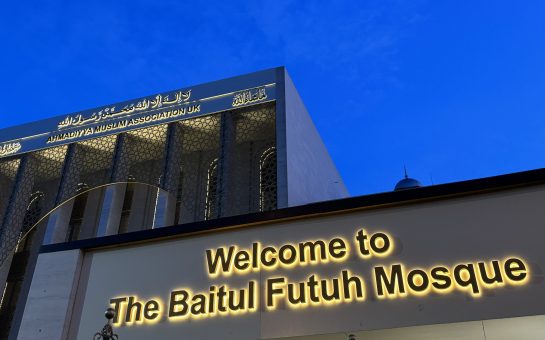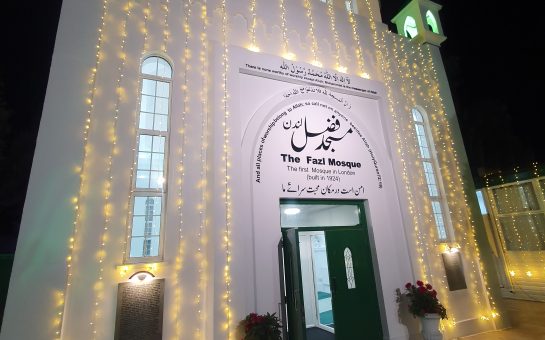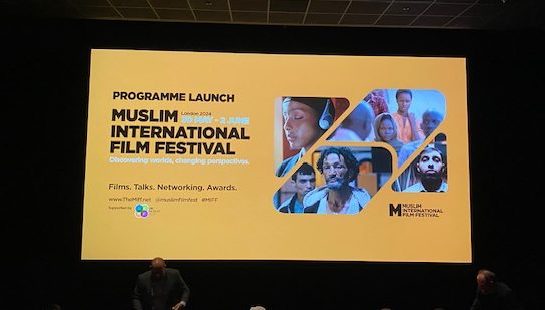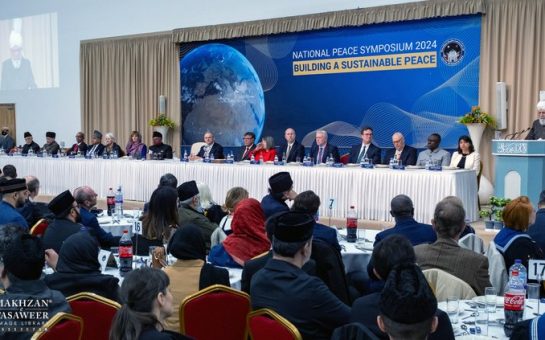At a time of increased religious tension across the globe, the Peace Symposium held by Ahmadiyya Muslims at the Baitul Futuh Mosque in Morden last month aimed to spread a message of peace and acceptance.
Imam Abdul Quddus spoke openly about the challenges faced by the world’s second-largest religion and Ahmadiyya Muslims in particular.
Abdul, who teaches young imams at the Jamia Ahmadiyya UK College in Surrey, is quick to acknowledge that the battle to win hearts and minds is no easy task. Through inviting journalists to the event, he hopes to convey a positive message.
“We invite a diverse range of press and hope sceptics might read or hear or listen to what the media is reporting,” the 28-year-old said.
“Some invites that we send out might even get a really negative response, but you just move on and hope that somewhere they can pick up a good story about the community or about Islam and that might curb their negativity.
“That’s probably one of the best ways to engage those people who would never attend a Muslim event.”
Ridding people of their worries and prejudices cannot be done overnight, but Ahmadiyya Muslims are certainly confronting the issue.
“We’re practising what the Quran says and that’s why we have a ‘True Islam’ campaign, where we go out to different countries including the UK, tell the world what true Islam is, not based on medieval thoughts and ideologies that people assume Islam is about,” Abdul continued.
“Events like these always help demonstrate the true nature of Islam. The responsibility is also with the media that they go out and look for the true stories. That engagement is really important.”
Vitriol from other Muslim denominations centres around the belief of Ahmadiyya Muslims that Mirza Ghulam Ahmad, an Indian religious leader who passed away in 1908, is the Messiah.
“Most ‘mainstream Muslims’ don’t think of us as Muslims,” said Abdul.
“We invite them to inter-faith dialogues, inter-faith events, but most of them don’t want to bother with us and it’s a huge struggle, but that doesn’t mean we’ve given up.
“What the Quran says is that you show patience, you show perseverance and you pray, and eventually you’ll see results. So if not today, tomorrow they’ll definitely engage with us and we’re always hopeful.”
Terrorist attacks in London Bridge, Borough Market, Westminster and Manchester helped to fan the flames of Islamophobia and the subsequent Finsbury Park Mosque incident and the reprehensible ‘Punish a Muslim Day’, has understandably left followers feeling on edge. What can the government do to stem this tide of hatred and promote harmony between people of all faiths or none?
Abdul said: “We have representatives who are invited to government, so the community’s very much involved.
“Unfortunately, some Muslims don’t co-operate and they consider it almost blasphemous to engage with the government and listen to them, because they feel so disenfranchised with British values,” Abdul added.
“We consider British values to be Islamic values as well, so for me, being Muslim and British isn’t something contradictory. The government’s doing the right thing. Yes, more engagement always helps, more education always helps, but they’re on the right track.”
Relationships also need to be repaired overseas. In Pakistan, tensions have been evident for decades. In 1974, the Second Amendment to the Constitution of Pakistan was passed, declaring ahmadis non-Muslims.
This is undoubtedly a source of great sadness for Abdul. Nevertheless, his response is defiant.
“We don’t care for any government to declare us Muslims or non-Muslims. Faith is to do with the heart,” Abdul asserted.
“We can’t call our mosques mosques, we can’t openly call the prayer, we can’t call our prayer the salat, which is the Muslim term. We believe these trials are from God and the more perseverance you show, the more communion we have with God almighty.
“The repairing is going to take generations, because it’s almost instilled within every Pakistani that ahmadis are non-Muslims. I hope and pray it’s not going to be a long process, but if you look at it in worldly terms it will take some time.
“We believe in the Muslim creed, we practise what we preach, we believe in the five pillars of Islam, we believe in the six articles of faith like every single Muslim. It’s up to no human to determine whether someone’s a believer or not.”




